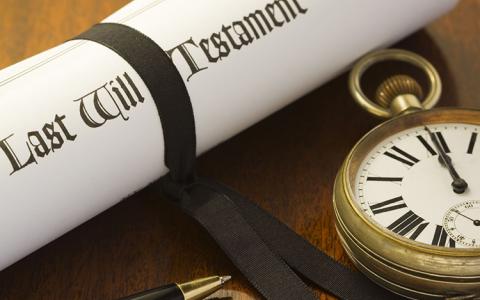
The period leading up to and shortly after losing a close relative is often one of the most emotionally demanding times we, as humans, experience. The crippling grief of loss, coupled with the toll of anticipatory grief, can make it difficult to think clearly and function effectively. When an inheritance is involved, it is especially important to be a responsible steward of the money you've received and do your best to integrate new funds into your broader financial plan. Below you'll find four considerations for managing inherited money.
1. Pause to organize your thoughts and future actions
Aside from attending immediate events such as a funeral or memorial service, it's important and necessary to take time to grieve and reflect on the loss of your loved one. It's also important to avoid the urge to make any sudden, large changes to your life if you've inherited a windfall. Once a bit of time has passed, you should have a candid discussion with other heirs to determine the full list of responsibilities at hand and who will manage each one. The pre-appointed executor, or court-appointed administrator, should spearhead this process.
2. Create a plan (and don't forget to act)
While this can be done as a team, take a full and complete inventory of the assets in your loved one's estate -- both probate (assets without a named beneficiary) and non-probate (assets with a named beneficiary). Remember to discontinue any of your loved one's subscription services and recurring household expenses (i.e., cable and electric) when the executor has deemed appropriate to do so. Once you've paid final expenses, created an action plan, and assigned responsibilities, it's time to act on distributing assets to heirs.
3. Integrate to avoid mental accounting
It might seem convenient to keep your inheritance separate from your existing portfolio, but new money should be integrated into your own financial plan as if it were earned income. According to a variety of behavioral finance studies, we tend to view inherited money as eligible to be spent on discretionary items -- we consider this money to be "found money." We also tend to mentally view inheritances as "separate" from previously earned money. The truth is, although it was not earned at a job or side gig, this money is very much yours and should be integrated into your existing financial plan -- if you have one! If you don't yet have a written financial plan, it's best to meet with a fee-only financial planner that charges by the hour or on a fixed-fee basis.
4. Ensure your financial priorities are met
Consider your inheritance an important opportunity to change the trajectory of your net worth. Use it to pay off or reduce long-standing debts, such as credit cards or student loans. Work on building an emergency fund -- at least six months' worth of living expenses -- that will cushion you from unforeseen circumstances, including a pandemic-era-like job loss. Ensure that Roth (or Backdoor Roth for those who exceed income limits for Roth) contributions are made for this year and last year, if you're still within the previous year's tax filing deadline. Investing in a taxable brokerage account is a great idea if any amounts remain after priorities have been addressed. Bigger goals, like paying off an entire mortgage, can be deferred if you're young and have locked in a favorable interest rate.
5. Be creative
It may be the case that you've inherited non-financial assets, like a car, artwork, or antiques. Strive to be open and honest with fellow heirs -- if you can truly use one of the items, say so. Separately, if you aren't ready to part with some of the items, offer them to extended family or friends. It can be comforting to know that otherwise unused belongings are put to good use by people you know. Alternatively, inherited artwork or antiques can often be repurposed or sold, and if you can afford to insure and maintain an additional vehicle -- and you want one -- inheriting one is a fortunate outcome. Try to avoid storing inherited items unless there is a plan to remove them within a specified timeframe, as storage charges can add up quickly over long periods of time.
Losing a close relative is difficult enough, but the need to prudently manage any inheritance will nonetheless loom large. In a perfect world, every family would have updated estate planning documents in place, with every family member agreeing as to the contents of said documents. This is rarely how it works out in practice, and it's important to take a deep breath, take your time, and do your best to be realistic, practical, and a bit creative in absorbing inherited assets into your own life.
This article originally appeared on Fool.com.



